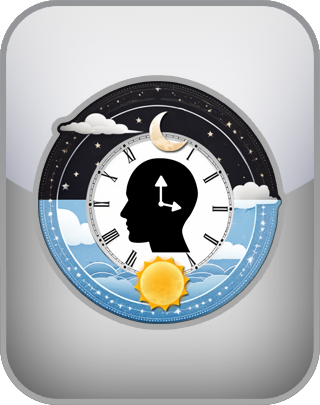Sleep Chronotype Test
What is your sleep animal?
The concept of sleep chronotype was developed by Dr. Michel Breus and delves into the individual variations in people's internal biological clocks, dictating their preferred timing for sleep and wakefulness throughout a 24-hour cycle. This biological preference influences when individuals feel most alert and productive, as well as when they naturally feel inclined to sleep. Understanding one's sleep chronotype is crucial for optimizing productivity, performance, and overall well-being, as it enables individuals to align their daily activities with their natural rhythms.
What is your sleep chronotype? For each of the following questions, indicate how well it applies to you.
Question 1 of 20
I tend to wake up between 6:30 and 9:00 a.m.
NEXT
The IDRlabs Sleep Chronotype Test was based on Dr. Michel Breus’ Chronotype Quiz and developed by IDRlabs.
The concept of sleep chronotype refers to individual differences in the timing of sleep and wakefulness, reflecting each person's biological predisposition to function optimally at different times of the day. Chronotypes influence when individuals feel most alert, productive, and sleepy, shaping their sleep-wake patterns and daily rhythms. Understanding sleep chronotypes has become increasingly relevant in the fields of sleep medicine, psychology, and public health as researchers seek to unravel the complexities of human sleep and its impact on health and well-being.
The study of sleep chronotypes has a rich history rooted in the field of chronobiology, the study of biological rhythms and timekeeping mechanisms in living organisms. Early research in chronobiology laid the foundation for understanding circadian rhythms, the internal biological clock that regulates the sleep-wake cycle, and other physiological processes over a 24-hour period. Scientists observed variations in circadian rhythms among individuals, leading to the recognition of distinct sleep chronotypes based on differences in timing preferences and sleep characteristics.
Recent developments in sleep chronotype research have focused on unraveling the underlying genetic, physiological, and environmental factors that shape individual sleep patterns. Advances in genetic sequencing technologies have enabled researchers to identify genetic variations associated with sleep chronotypes, shedding light on the molecular mechanisms underlying circadian rhythms and sleep regulation. Additionally, studies have explored the impact of lifestyle factors, such as work schedules, light exposure, and social habits, on sleep chronotypes, highlighting the importance of environmental influences on sleep timing and quality.
Looking ahead, the field of sleep chronotype research continues to evolve, with ongoing efforts to translate scientific findings into practical applications for improving sleep health and performance. Emerging research aims to develop personalized interventions and treatments tailored to individuals' unique sleep chronotypes, optimizing sleep schedules, and promoting overall well-being. By deepening our understanding of sleep chronotypes and their implications for health and performance, researchers strive to empower individuals to take control of their sleep habits and achieve better sleep outcomes.
Dr. Michael Breus, a clinical psychologist known as "The Sleep Doctor," has outlined four distinct sleep chronotypes, shedding light on the diverse ways individuals experience and regulate their sleep-wake cycles. These chronotypes—Bears, Lions, Wolves, and Dolphins—provide valuable insights into individuals' natural sleep preferences, energy patterns, and optimal times for rest and productivity.
Understanding these sleep chronotypes offers valuable insights into individual sleep preferences, tendencies, and optimal times for rest and productivity. By identifying one's chronotype, individuals can tailor their daily routines, work schedules, and sleep habits to align with their natural biological rhythms, leading to improved sleep quality, mood, and overall well-being. Dr. Breus's research highlights the importance of recognizing and respecting individual differences in sleep patterns, fostering a more holistic approach to sleep health and wellness.
As the publishers of this free test, which allows you to screen yourself for your sleep chronotype, we have strived to make the test as reliable and valid as possible by subjecting this test to statistical controls and validation. However, free online quizzes such as the present test do not provide professional assessments or recommendations of any kind; the test is provided entirely “as-is.” For more information about any of our online tests and quizzes, please consult our Terms of Service.

 English
English  Español
Español  Português
Português  Italiano
Italiano  Polski
Polski 